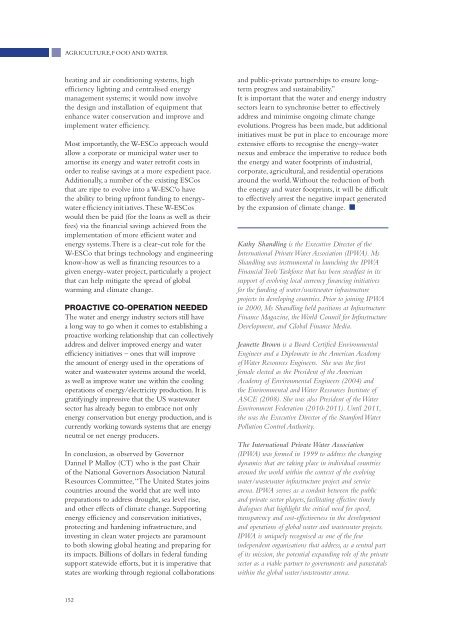Climate Action 2012-2013
Create successful ePaper yourself
Turn your PDF publications into a flip-book with our unique Google optimized e-Paper software.
AGRICULTURE, FOOD AND WATER<br />
heating and air conditioning systems, high<br />
efficiency lighting and centralised energy<br />
management systems; it would now involve<br />
the design and installation of equipment that<br />
enhance water conservation and improve and<br />
implement water efficiency.<br />
Most importantly, the W-ESCo approach would<br />
allow a corporate or municipal water user to<br />
amortise its energy and water retrofit costs in<br />
order to realise savings at a more expedient pace.<br />
Additionally, a number of the existing ESCos<br />
that are ripe to evolve into a W-ESC'o have<br />
the ability to bring upfront funding to energywater<br />
efficiency initiatives. These W-ESCos<br />
would then be paid (for the loans as well as their<br />
fees) via the financial savings achieved from the<br />
implementation of more efficient water and<br />
energy systems. There is a clear-cut role for the<br />
W-ESCo that brings technology and engineering<br />
know-how as well as financing resources to a<br />
given energy-water project, particularly a project<br />
that can help mitigate the spread of global<br />
warming and climate change.<br />
PROACTIVE CO-OPERATION NEEDED<br />
The water and energy industry sectors still have<br />
a long way to go when it comes to establishing a<br />
proactive working relationship that can collectively<br />
address and deliver improved energy and water<br />
efficiency initiatives – ones that will improve<br />
the amount of energy used in the operations of<br />
water and wastewater systems around the world,<br />
as well as improve water use within the cooling<br />
operations of energy/electricity production. It is<br />
gratifyingly impressive that the US wastewater<br />
sector has already begun to embrace not only<br />
energy conservation but energy production, and is<br />
currently working towards systems that are energy<br />
neutral or net energy producers.<br />
In conclusion, as observed by Governor<br />
Dannel P Malloy (CT) who is the past Chair<br />
of the National Governors Association Natural<br />
Resources Committee, “The United States joins<br />
countries around the world that are well into<br />
preparations to address drought, sea level rise,<br />
and other effects of climate change. Supporting<br />
energy efficiency and conservation initiatives,<br />
protecting and hardening infrastructure, and<br />
investing in clean water projects are paramount<br />
to both slowing global heating and preparing for<br />
its impacts. Billions of dollars in federal funding<br />
support statewide efforts, but it is imperative that<br />
states are working through regional collaborations<br />
and public-private partnerships to ensure longterm<br />
progress and sustainability.”<br />
It is important that the water and energy industry<br />
sectors learn to synchronise better to effectively<br />
address and minimise ongoing climate change<br />
evolutions. Progress has been made, but additional<br />
initiatives must be put in place to encourage more<br />
extensive efforts to recognise the energy–water<br />
nexus and embrace the imperative to reduce both<br />
the energy and water footprints of industrial,<br />
corporate, agricultural, and residential operations<br />
around the world. Without the reduction of both<br />
the energy and water footprints, it will be difficult<br />
to effectively arrest the negative impact generated<br />
by the expansion of climate change. <br />
Kathy Shandling is the Executive Director of the<br />
International Private Water Association (IPWA). Ms<br />
Shandling was instrumental in launching the IPWA<br />
Financial Tools Taskforce that has been steadfast in its<br />
support of evolving local currency financing initiatives<br />
for the funding of water/wastewater infrastructure<br />
projects in developing countries. Prior to joining IPWA<br />
in 2000, Ms Shandling held positions at Infrastructure<br />
Finance Magazine, the World Council for Infrastructure<br />
Development, and Global Finance Media.<br />
Jeanette Brown is a Board Certified Environmental<br />
Engineer and a Diplomate in the American Academy<br />
of Water Resources Engineers. She was the first<br />
female elected as the President of the American<br />
Academy of Environmental Engineers (2004) and<br />
the Environmental and Water Resources Institute of<br />
ASCE (2008). She was also President of the Water<br />
Environment Federation (2010-2011). Until 2011,<br />
she was the Executive Director of the Stamford Water<br />
Pollution Control Authority.<br />
The International Private Water Association<br />
(IPWA) was formed in 1999 to address the changing<br />
dynamics that are taking place in individual countries<br />
around the world within the context of the evolving<br />
water/wastewater infrastructure project and service<br />
arena. IPWA serves as a conduit between the public<br />
and private sector players, facilitating effective timely<br />
dialogues that highlight the critical need for speed,<br />
transparency and cost-effectiveness in the development<br />
and operations of global water and wastewater projects.<br />
IPWA is uniquely recognised as one of the few<br />
independent organisations that address, as a central part<br />
of its mission, the potential expanding role of the private<br />
sector as a viable partner to governments and parastatals<br />
within the global water/wastewater arena.<br />
152












